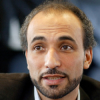Tariq Ramadan

Tariq Ramadan
Tariq Ramadanis a Swiss academic, philosopher and writer. He is the professor of Contemporary Islamic Studies in the Faculty of Oriental Studies at St Antony's College, Oxford and also teaches at the Oxford Faculty of Theology. He is a visiting professor at the Faculty of Islamic Studies, the Université Mundiapolisand several other universities around world. He is also a senior research fellow at Doshisha University. He is the director of the Research Centre of Islamic Legislation and Ethics, based in...
NationalitySwiss
ProfessionWriter
Date of Birth26 August 1962
CountrySwitzerland
It's okay to feel the need for protection if there is a real external threat. But to feel protective from the inside, it's a kind of jail: you get so protective that you cannot get out of the box.
We need to acknowledge that there is a real issue with how the Scriptures are being interpreted. Whenever I am told that terrorists are not Muslim, I systematically reply that they actually are, and they cannot be marginalised, the same way they are marginalising other Muslim people. Scriptures are quoted even though their interpretations are twisted. In the face of misinterpretation the only way out would be using another interpretation of the Scriptures.
The 21st century - and the atheists - needs the presence of religion, just as religion must deal with the real challenges and the thinkers of the day in order to sharpen the conscience and the intelligence of those who study the timeless sacred texts in a spirit of responding to the questions of their time.
Saying that I am talking out of both sides of my mouth just proves my very point. Politicians would bypass real social issues by referring to my grandfather, who founded the Muslim Brotherhood, or to my brother, currently chairman of the Islamic Centre in Geneva.
We need to realize that we should be on the side of any human being who is oppressed.
Discomfort levels in our societies are rising, or so it would seem. In theory, we invoke diversity and tolerance. But in real life, we raise our hackles and withdraw into ourselves.
When you're overwhelmed by your emotion, you listen less and you judge more. This is also the reality of the dogmatic mind.
I think that political parties are fuelling this fear in order to create divisions. The more we bring up fear, the more we neglect real political issues. Political debate in France is crumbling since every single issue is brought to Islam now.
I think what we are seeing is a vicious circle: by covering the controversies and the conflicting realities, it creates a much distorted perception of Islam and Muslims. When a minority is being taken as a majority, it creates a wrong image.
Just take Germany and the suffering of Jews during and after the Second World War. It would be legal to ridicule and to laugh at this suffering, but since it was such a trauma on the European conscience, no one is going to do it. It is an open scar, an open wound, an open reality.
It's clear there is nothing in my record supporting terrorism.
We all cherish freedom of speech, but with a reasonable approach and a reasonable use of it. If we come to this, it is a debate. If not, then it is a power struggle. Who is going to win, the Muslim principles or the Western principles?
I've never suffered because of my heritage in Europe.
Many U.S. organizations believe that I am being barred from the country not because of my actions but because of my ideas. The conclusion seems inescapable.